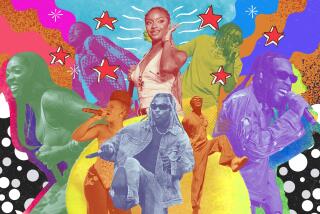Ladysmith Black Mambazo Finds Freedom to Celebrate
- Share via
Ladysmith Black Mambazo, the South African singing group that came to international fame in 1986 accompanying Paul Simon, did not turn its music to overt protest during the apartheid era that ended in 1994. But its performances tacitly made the point that no culture capable of producing such lively, accomplished and life-affirming art deserved to be under anybody’s heel.
Saturday at the Irvine Barclay Theatre, leader Joseph Shabalala and his nine men made a tacit declaration of freedom by not singing “Homeless,” the lovely plaint about dispossession that appeared on Simon’s “Graceland” album and is by far Black Mambazo’s most widely heard song in America. No longer politically dispossessed in their own country, and no longer in need of a famous patron in this one, the now well-established Zulu a cappella group devoted its two 50-minute sets mainly to fun and celebration.
While Shabalala’s music is grounded in Christian faith, this show was less given to hymns and homilies than to humor and hot-running rhythm. In song after song, Black Mambazo’s team of bass voices turned into a mighty engine, driving the group through emphatic, chugging passages that were repeated at length.
As always, the group gave shape to its musical energy with synchronized dancing, rigorous and athletic enough to make Motown’s finest look like amateurs at a high school talent night. It all bespoke a breathtaking group discipline, but at the same time the show’s upbeat mood seemed to suggest that one of the fruits freedom brings is greater leeway to just have fun.
More to Read
The biggest entertainment stories
Get our big stories about Hollywood, film, television, music, arts, culture and more right in your inbox as soon as they publish.
You may occasionally receive promotional content from the Los Angeles Times.











